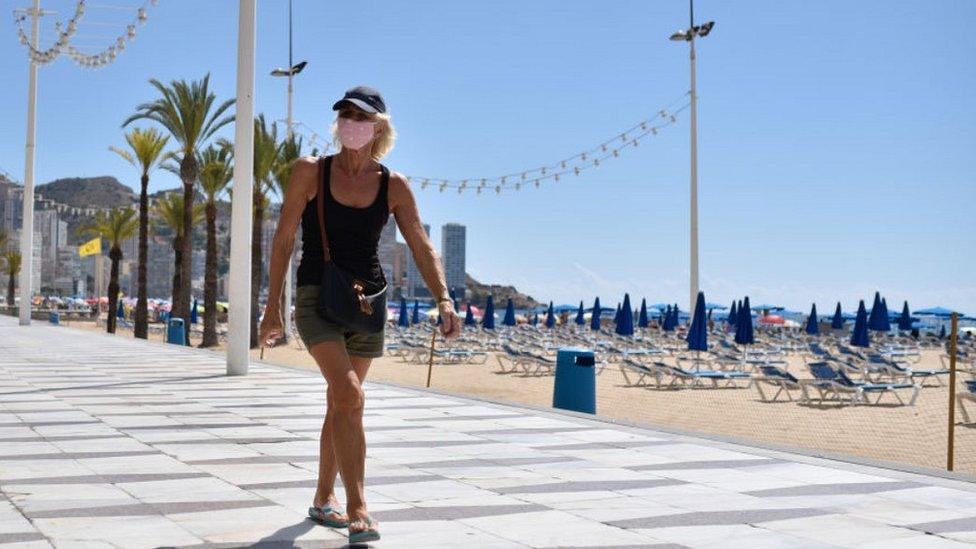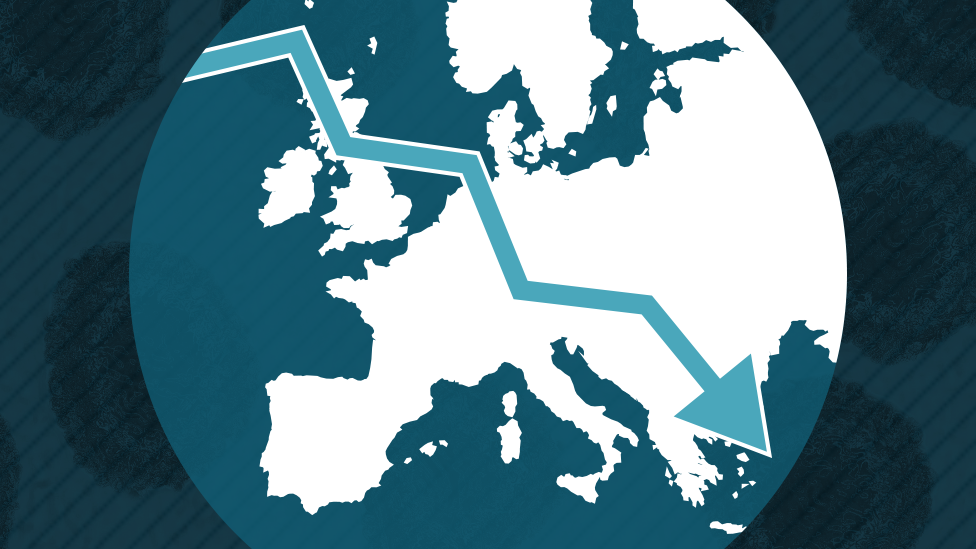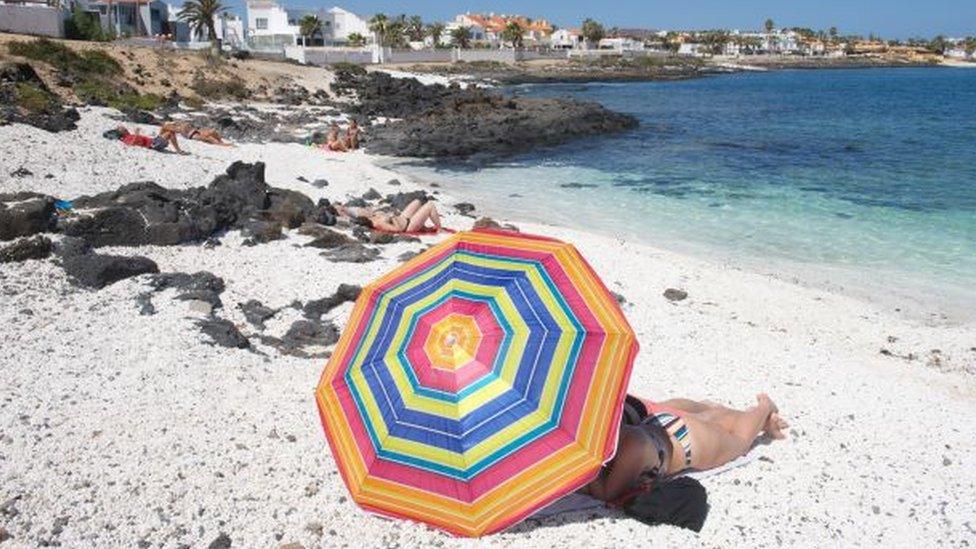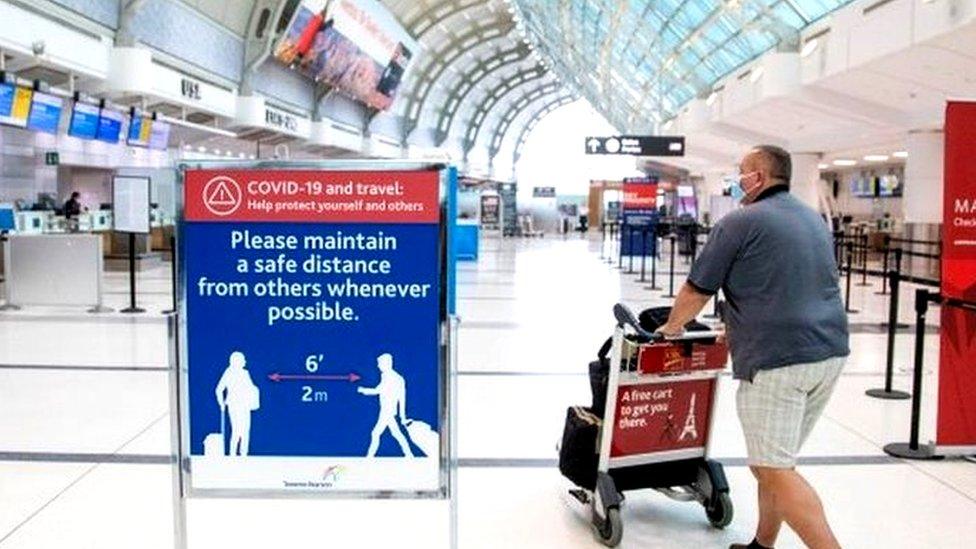Coronavirus: Spain to lift restrictions for UK and Japanese travellers
- Published

British tourists going to Spain will still have to quarantine on their return
Spain has said it is officially lifting restrictions for UK travellers from Monday, when a decree takes effect.
The government says the UK and Japan will be on a list of countries whose residents are able to avoid restrictions on non-essential travel to the EU. They will not need a PCR test.
UK tourists going to Spain will still have to quarantine on their return.
Meanwhile, Germany announced that anyone arriving from the UK would have to quarantine for two weeks.
The German public health institute said the decision was related to the Indian Covid-19 variant, which is responsible for the majority of new cases in parts of England and is believed to spread more quickly.
The UK government still strongly advises against non-essential travel to most other EU countries, including Germany and Spain.
Earlier, Prime Minister Boris Johnson's spokesman said: "We've been clear people shouldn't be travelling to amber list [nations] for the purpose of holidays. Our advice hasn't changed. We will keep the green list under review… and will add countries where possible."
Portugal is the main destination on the UK's short "green" list of countries that are free of the quarantine requirement. Under the UK's traffic light system, people are advised to avoid amber and red countries, where the Covid risk is greater.
The EU is currently deciding on an expanded "white list" of countries whose citizens can enter the EU freely.
Only seven, with very low Covid infection rates, are on the list now. Those countries are: Australia, Israel, New Zealand, Rwanda, Singapore, South Korea and Thailand.
The BBC has been told a final EU decision on expanding the list has been delayed for another two weeks.
Tourism in Portugal and Spain relies heavily on British visitors in the summer, and travellers from England, Scotland and Wales began flying to Portugal last Monday.
Holidaying Brits touch down in Portugal: 'It feels unreal'
Spain will allow people from other non-EU countries who have been vaccinated against Covid-19 to enter the country from 7 June, Prime Minister Pedro Sánchez said. They will include US citizens.
Mr Sánchez said the lifting of these curbs should allow Spain's summer tourism to reach 30-40% of 2019 levels.
The EU has decided that visitors should be allowed to come from countries with an incidence rate of below 75 cases per 100,000 people.
Under those terms, UK travellers would be eligible but there are ongoing concerns about the Indian Covid-19 variant.
Some EU countries are hesitating over the UK, as they want to see how the surge of British cases related to the Indian variant plays out.
EU envoys have also recommended that non-essential travel should be allowed from outside the EU for people who have been fully vaccinated. However, they say it should be up to member states to decide on measures they impose, such as Covid tests or quarantine.
'Round in circles'
On Thursday EU politicians agreed on the technicalities of an EU Digital Covid Certificate, external - essentially a health passport for EU citizens to travel inside the 27-nation bloc. It will show a traveller's vaccination record.
The EU has been racing to get the certificate ready for summer tourism, as countries emerging from months of lockdown are desperate to revive their hospitality industries.
The EU certificate is now "well on track to be ready end of June, as planned," an official statement said.
Currently UK citizens travelling to amber list countries - that is, most of the EU - can face unexpected border obstacles, despite completing the formalities.
Lis Nixon from Oxfordshire told the BBC on Thursday that she was turned away at the Iberia desk at Heathrow, despite having an urgent family reason to visit Spain. Her son, daughter-in-law and grandson live in Estella, Spain, and needed her there, she said.
"The woman at the desk said I needed authorisation from the Spanish consulate. There's nothing in all of the government advice that says I need to do that. When I try phoning the consulate, it says the mailbox is full. The phone number says you need to book an appointment, so you just go round in circles.
"So, I couldn't get through this morning. The woman at the airport said they'd been only having this problem with UK passport holders," she said.

Are you planning a trip to Spain? Get in touch by emailing haveyoursay@bbc.co.uk, external.
Please include a contact number if you are willing to speak to a BBC journalist. You can also get in touch in the following ways:
WhatsApp: +44 7756 165803
Tweet: @BBC_HaveYourSay, external
Please read our terms & conditions and privacy policy
If you are reading this page and can't see the form you will need to visit the mobile version of the BBC website to submit your question or comment or you can email us at HaveYourSay@bbc.co.uk, external. Please include your name, age and location with any submission.
- Published11 February 2022

- Published25 June 2021

- Published28 April 2021

- Published26 July 2021
